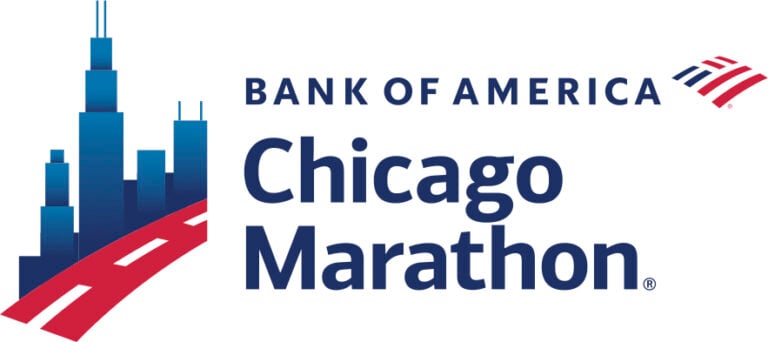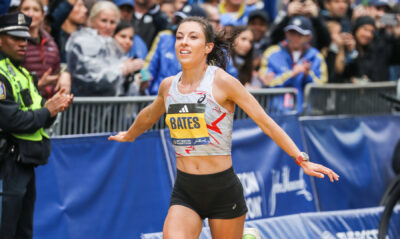Chicago Marathon Fields Announced: Will the World and American Records Go Down, Does Rupp Have Anything Left: The Big Questions
By Jonathan GaultOn Tuesday, the Bank of America Chicago Marathon announced the full elite fields for this year’s race, due to take place on October 8. It is set to be one of the most exciting editions in recent memory. We already knew that Emily Sisson, Sifan Hassan, and Ruth Chepngetich would be heading to the Windy City, and now we know they will be joined by Valencia/London champion Kelvin Kiptum, defending champion Benson Kipruto, 2021 London champion Joyciline Jepkosgei, and a strong field of Americans who will be competing less than four months out from the Olympic Marathon Trials in Orlando on February 3. Conner Mantz and 2017 Chicago champ Galen Rupp are the headliners on the men’s side while the women’s race features a mini-Trials with Sisson, Emma Bates, Aliphine Tuliamuk, and Olympic bronze medalist Molly Seidel, among others.
Full elite fields below, followed by my four biggest questions with just over 10 weeks to go until race day.
Men’s elite field
Name Country Personal Best
Kelvin Kiptum KEN 2:01:25 (London, 2023)
Bashir Abdi BEL 2:03:36 (Rotterdam, 2021)
Benson Kipruto KEN 2:04:24 (Chicago, 2022)
Dawit Wolde ETH 2:04:27 (Rotterdam, 2021)
Seifu Tura ETH 2:04:29 (Milan, 2021)
Daniel Do Nascimento BRA 2:04:51 (Seoul, 2022)
John Korir KEN 2:05:01 (Chicago, 2022)
Galen Rupp USA 2:06:07 (Prague, 2018)
Huseydin Mohamed ETH 2:05:05 (Amsterdam, 2022)
Milkesa Mengesha ETH 2:05:29 (Valencia, 2022)
Conner Mantz USA 2:08:16 (Chicago, 2022)
Yuki Matsumura JPN 2:09:01 (Otsu, 2021)
Takashi Ichida JPN 2:09:15 (Oita, 2022)
Kei Katanishi JPN 2:09:27 (Otsu, 2021)
Masashi Nonaka JPN 2:09:47 (Osaka, 2023)
Matt McDonald USA 2:09:49 (Chicago, 2022)
Mick Iacofano USA 2:09:55 (Chandler, 2020)
Masaki Tuda JPN 2:10:40 (Oita, 2023)
Mizuki Higashi JPN 2:11:04 (Tokyo, 2023)
Colin Mickow USA 2:11:22 (Chandler, 2020)
Frank Lara USA 2:11:32 (Houston, 2022)
Dan Kremske USA 2:14:53 (Chicago 2019)
Daniel Mateiko KEN Debut
Wesley Kiptoo KEN Debut
Women’s elite field
Name Country Personal Best
Ruth Chepngetich KEN 2:14:18 (Chicago, 2022)
Joyciline Jepkosgei KEN 2:17:43 (London, 2021)
Genzebe Dibaba ETH 2:18:05 (Amsterdam, 2022)
Sutume Kebede ETH 2:18:12 (Seoul, 2022)
Emily Sisson USA 2:18:29 (Chicago, 2022)
Sifan Hassan NED 2:18:33 (London, 2023)
Tigist Girma ETH 2:18:52 (Valencia, 2022)
Ababel Yesheneh Eth 2:20:51 (Chicago, 2019)
Des Linden USA 2:22:38 (Boston, 2011)
Emma Bates USA 2:23:18 (Eugene, 2022)
Aliphine Tuliamuk USA 2:24:37 (Boston, 2023)
Nell Rojas USA 2:24:51 (Boston, 2023)
Molly Seidel USA 2:24:42 (New York, 2021)
Dakotah Lindwurm USA 2:25:01 (Duluth, 2022)
Sara Vaughn USA 2:26:23 (Chicago, 2022)
Gabriella Rooker USA 2:27:38 (Duluth, 2023)
Diane Nukuri USA 2:27:50 (London, 2015)
Maggie Montoya USA 2:28:07 (Chicago, 2022)
Stacy Ndiwa KEN 2:31:53 (Istanbul, 2022)
What will the world records be after this race?
Kenya’s Kelvin Kiptum has run two marathons in his life and in those races, he ran the second-fastest (2:01:25) and fifth-fastest (2:01:53) marathons of all time. Considering Kiptum, 23, ran huge negative splits in both races (61:38-60:15 in Valencia, 61:40-59:45 in London), the next logical goal for him would be to challenge Eliud Kipchoge‘s world record of 2:01:09.
Berlin has become the de facto course for world record attempts — that’s where the last eight men’s world records have been set — but that may not have been an option for Kiptum. Kipchoge is running Berlin this year and it’s possible Kipchoge/Kiptum did not want to race each other and/or that Berlin did not have the budget for both. Chicago is also a very fast course, though — it hosted men’s world records in 1984 and 1999 and women’s world records in 2001, 2002, and 2019. The big thing with the Chicago is weather, which is a little more variable than Berlin. If it’s hot on October 8, any shot at the world record likely flies out the window.
It is a bummer — though not entirely unexpected — that Kipchoge will not be facing Kiptum this fall. The two are to marathoning what Carlos Alcaraz and Novak Djokovic are to tennis right now, the young phenom against the aging GOAT. But while tennis fans got to see Alcaraz and Djokovic square off at the French Open and Wimbledon (and maybe the US Open too), running fans will have to wait until 2024 at the earliest to see Kipchoge vs Kiptum.
When I spoke to Kipchoge two weeks ago, he said he wished Kiptum well and did not feel any pressure to lower his world record in Berlin before Kiptum runs his fall marathon. But between Kipchoge in Berlin and Kiptum in Chicago, it’s possible the world record will be in the 2:00s by the end of 2023.
The women’s world record could be under threat in Chicago as well. Remember, last year Ruth Chepngetich missed it by 14 seconds, running 2:14:18 despite crazy splits of 65:44-68:34. She’s back in Chicago in 2023.
Can an American hit the Olympic standard? (Looking at you, Conner Mantz)
After he finished 6th in the 10,000 at USAs earlier this month, a few journalists and I were chatting with Conner Mantz in the mixed zone at USAs. He mentioned how he wanted to run under the Olympic standard of 2:08:10 because no American had done it yet during the Olympic qualification window (which opened November 1, 2022). Considering he ran 2:08:16 in his debut in Chicago last year, Mantz doesn’t need to improve much to do it.
But Mantz is not just running for himself. All of those guys that will be trying to beat Mantz at the Olympic Trials in February? They’ll be rooting for Mantz in this race.
Why? It has to do with the new Olympic qualifying system. There are 80 spots per sex in the Olympic marathon, with anyone who hits the auto standard (2:08:10 for men, 2:26:50 for women) or finishes in the top five in a Platinum label marathon (the six majors plus Xiamen, Osaka, Nagoya, Seoul, Sydney, Amsterdam, Shanghai, Valencia) during the qualifying window considered qualified. In addition, World Athletics will take anyone in the top 65 of the filtered “Road to Paris” list on January 30, 2024, and if there are still any spots left after that, they’ll be allocated via world ranking at the end of the qualifying period on April 30, 2024.
In addition to making the standards much harder, World Athletics said that any country can sub in an “unqualified” athlete for a “qualified” athlete as long as the unqualified athlete has run at least 2:11:30/2:29:30 during the qualification window. A bunch of American women have done that already, so the top three finishers in the women’s race at the Trials will all qualify for Paris as long as they have broken 2:29:30. But no American men have qualified for Paris yet.
The US has a decent shot to have three men in the top 65 on January 30 (or three in the top 80 by the end of the qualification window) but because the Road to Paris list does not yet exist and many athletes have only run one marathon within the ranking period (you need two to get a ranking), it’s hard to make definitive projections right now. Plus David Monti reported that as of May 19, 49 athletes (respecting the three-athlete-per-country rule) have already hit the Olympic standard. That still leaves 31 ranking spots available, but more athletes should hit the standard in the fall of 2023 and spring of 2024.
All of this is to say that USATF and American marathoners would sleep easier if three Americans can hit the auto standard this fall either by running faster than 2:08:10 or by finishing in the top 5 at a Platinum race at Chicago. Obviously, that’s not easy to do, but Mantz will have one of the best opportunities this fall in Chicago. His US rivals will be hoping he does it to “unlock” an Olympic spot…one that they could then try to steal by beating Mantz at the Trials in February.
What does Galen Rupp have left?
Galen Rupp has never been beaten by an American in a marathon that he has finished. The first part of that sentence shows why Rupp, even at age 37, must be considered a threat to make his fifth Olympic team next year (and third in the marathon). But the second half of that sentence is just as important. Since the start of 2022, Rupp has run just five races while battling a herniated disc and nerve issues in his leg:
Galen Rupp’s races since January 1, 2022
| Date | Race | Time | Place |
| March 5, 2022 | US 15K champs | 43:31 | 7th |
| March 20, 2022 | NYC Half | N/A | DNF |
| July 17, 2022 | Worlds marathon | 2:09:36 | 19th |
| November 6, 2022 | NYC Marathon | N/A | DNF |
| March 19, 2023 | NYC Half | 64:57 | 17th |
That’s two DNFs and three subpar results by Rupp’s standards. In retrospect, running NYC was probably mistake — even though it was cool to see Rupp tackle the iconic course, he would have been better served taking some time to get truly healthy, and he wisely skipped a spring marathon this year for that purpose. The question is, will we ever see the old Galen Rupp again?
Rupp’s recent results aren’t encouraging, but there are reasons for optimism. Meb was 40 when he made his final Olympic team and Abdi was 43, so Rupp’s age isn’t the issue. And Rupp isn’t that far removed from being one of the best in the world — just two years ago, he was 8th at the Olympics and finished 2nd in Chicago in 2:06:35.
It’s also worth noting that Rupp ran 2:09:46 at Worlds a year ago — a time that all but a handful of Americans would struggle to run — and that was despite stopping to walk multiple times late in the race. Even a hobbled Rupp could have enough to make the Olympic team. But he’s no longer the lock he was in 2016 and 2020.
That’s why Chicago will be a key test, but even then it’s not the be-all, end-all. Remember, in 2019 Rupp tried to run Chicago when he wasn’t quite ready to return from Achilles surgery. He wound up dropping out but proceeded to dominate the Olympic Trials four months later. A good race here would put Rupp firmly back in the Olympic conversation, but no matter how Chicago goes, he can’t be totally counted out.
Who will be the top US woman/will the American record go down again?
Emily Sisson, who set the American record of 2:18:29 in Chicago last year to finish 2nd, is back in 2023 and will be joined by Emma Bates, who set a pb of her own in Boston in April, running 2:22:10 to finish 5th. Before that race, Bates told the press she believed she was in American record shape and afterward she said she would try to take a crack at the record this fall. Most assumed that meant she would be running Chicago, and the prospect of a Sisson-Bates duel is certainly exciting.
But while an American record would be cool, I’m more excited to see who finishes as the top American in this race. Sisson and Bates aren’t the only big names lining up in Chicago. They’ll be joined by 2020 Olympic Trials champ Aliphine Tuliamuk and Nell Rojas (both of whom ran 2:24 pbs in Boston in April) plus two-time Olympian Des Linden and reigning Olympic bronze medalist Molly Seidel, who will be running her first marathon since her DNF in Boston in April 2022.
Several top Americans won’t be in Chicago — Keira D’Amato, Sara Hall, and Betsy Saina are among the notable absences — but the above names should offer something of a Trials preview in Chicago, albeit in a very different style of race. In Chicago, Sisson, Bates, and perhaps others will be chasing a fast time and will have pacemakers, elite Africans, and sub-elite men to run with in pursuit of that quest. The Olympic Trials field will consist of American women only, times will be irrelevant, and the weather should be warmer in Orlando than Chicago. Just about the only thing the two races will have in common are that both courses will be flat.
Seidel will be worth watching closely. Her talent is beyond doubt, but since her career year in 2021, she has been through a lot: injuries, depression, an eating disorder, and, most recently, anemia. Her Tilastopaja profile lists only two road races this year — 73:08 for 8th at the US Half Marathon champs in February, 33:35 for 17th at the B.A.A. 10K in June. That suggests that she may not have enough time to turn things around before the Trials, but Seidel’s times aren’t that different from the year before she made the Olympic team. In 2019, she ran 32:55 at the B.A.A. 10K, then 33:18 at the Peachtree Road Race and only ran the Olympic Trials on a whim after qualifying with a 70:27 half in December.










